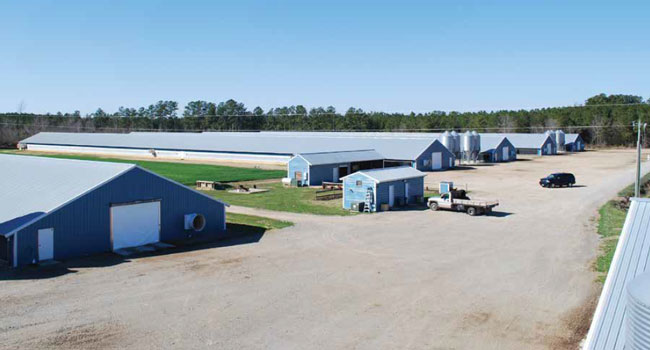
An Eye On Farming
Prestage Farms rolls out surveillance equipment to keep things in perspective
- By Brendan MacDaniel
- Jul 01, 2016
Founded in 1983, Prestage Farms and its affiliates produce more than
one billion pounds of turkey and pork annually. From its corporate
headquarters in North Carolina, the company now employs some
1,800 associates and contracts with over 400 farm families. It maintains
one of the world’s largest turkey hatching facilities, and has
expanded across state lines to include pork divisions in Mississippi, Iowa, South
Carolina and Oklahoma.
THE GOAL: SAFE FOOD PRODUCTION
As a major part of the world’s food production system, the owners of Prestage
Farms are dedicated to producing safe and nutritious food for consumers. They
pride themselves on the company’s long legacy of producing pork and turkey in
a responsible, ethical and humane manner. They are committed to exceeding the
expectations of their customers and communities, as well as meeting the highest
standards regarding animal welfare they have established for themselves.
“When we first started talking about installing a surveillance system, we wanted
to have cameras and recorders that were affordable and easy to operate” said
Bradley Faircloth, business analyst at Prestage Farms. “The equipment works in the
background, and if an incident occurs, we just access the NVR and pull up the footage
easily. It lets us see what happened so we can concentrate on fixing the situation.”
Although poultry farming has been considered by many to be a relatively lowtech
operation, management of Prestage Farms has instead embraced technology
as a means of ensuring the highest quality products possible, and they approached
Clinton, North Carolina-based security integrator Star Communications for help.
MONITORING PROCESSES AND ENHANCING DAILY OPERATIONS
In the first stage of what will be an extensive multi-phase project, the integrator
paired Honeywell’s Performance Series 1080p IR cameras with Performance Series
PoE embedded NVRs in several turkey houses and the truck wash bay area.
The resulting surveillance platform helps farm operators monitor processes and
enhance daily operations.
“It gives us peace of mind because it also lets us be upfront with our business
operations,” Faircloth said. “It gives us the ability to show that we do what we
say we do.”
Star Communications decided to go
with Honeywell because of past success
with their products and services in
the past.
“The Performance Series products
are competitively priced, and the threeyear
warranty was a high selling point,”
said Eric Tew, security manager at Star
Communications.
Because the poultry houses generate
high levels of dust, the equipment must
withstand a challenging environment.
“The cameras and NVRs are all selfcontained
and fully enclosed, so the
equipment is protected—that means
more reliable operation and longer unit
life,” Tew said.
FUTURE EXPANDABILITY
Another important reason the integrator
chose Honeywell’s Performance Series:
future expandability. As the project
has grown, the cameras and NVRs
are expected to be installed in more
than 20 poultry houses across the state
of North Carolina. Ultimately, the goal
is to network those sites with the company
headquarters. The farm’s managers
are enthusiastic about using the
remote viewing capability and incident
alerts in the future.
“The Performance Series line is perfect
for an entry- to mid-level installation,
yet it lends itself for growth in the
future,” Faircloth said.
AFFORDABLE AND FLEXIBLE
Because the surveillance project will be
implemented in so many diverse locations
over an extended period of time,
the company found the cost-effective
Performance Series line to be an ideal fit.
“The cameras and NVRs are affordable—
and they can all operate on
a standalone basis, so once the system
is installed, there’s no ongoing operational
cost,” Faircloth said.
In addition to giving site managers
more flexibility in undertaking their
daily chores, the Honeywell system will
allow the company to oversee employee
activity, as well as more closely monitor
the health and activity of the birds. It
will also provide more transparency regarding
the company’s perceived treatment
of animals.
“This installation was different
from many conventional security applications
because the poultry houses
are all located in rural areas with no
Internet access,” Tew said. “The farmers
don’t need cameras to address the
level of criminal activity that might be
present in more populated areas—they
simply use the technology to keep an
eye on the enclosures and make sure
the birds are okay. Ultimately, their
goal is to keep food safer.”
This article originally appeared in the July 2016 issue of Security Today.